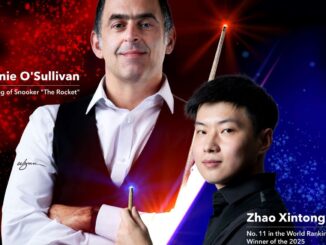
Snooker Champion was Compared to Ronnie O’Sullivan But Played Last Pro Match Aged 31.
David Gray was once considered one of the brightest prospects in snooker. With a fluid cue action, natural talent, and a calm demeanor on the table, many in the sport believed he was destined for greatness. Early in his career, comparisons were even made between Gray and the legendary Ronnie O’Sullivan. However, while O’Sullivan went on to become arguably the greatest player in the history of the game, Gray’s career faded far too soon, with his final professional match coming at just 31 years old.
Born in 1979 in London, Gray turned professional in 1996 at the age of 17. His progress was rapid, and he quickly established himself as a dangerous competitor on the tour. In 2000, he made headlines by becoming only the second player in history to whitewash Ronnie O’Sullivan in a ranking event, defeating him 9–0 in the Scottish Open. This remarkable performance fueled speculation that Gray could become a future world champion.
Just three years later, Gray captured his first and only ranking title, winning the 2003 Scottish Open by defeating Mark Selby 9–7 in the final. That same year, he reached the semi-finals of the UK Championship and climbed to a career-high world ranking of No. 12. His talent was undeniable, and many believed this was just the beginning of a long and successful career at the top level.
Yet, Gray’s form began to falter in the years that followed. Consistency eluded him, and his results became increasingly erratic. Despite flashes of brilliance, including a memorable 147 maximum break at the 2004 UK Championship, Gray struggled to maintain the mental edge required to compete at the highest level week in and week out.
By the late 2000s, his ranking began to slide, and he found himself dropping out of the top 32. The rise of a new generation of stars and a more competitive tour further complicated his path back to the elite. In 2010, at just 31 years of age, David Gray played his final professional match, quietly stepping away from the sport that once held such promise for him.
The reasons for his decline remain speculative, though it’s widely believed that motivation, focus, and perhaps off-table distractions played a role. Unlike O’Sullivan, who has famously battled his own demons but continued to evolve and compete at the highest level, Gray never quite found a second wind.
Though his career didn’t deliver the accolades many had predicted, David Gray remains a reminder of how fragile potential can be in professional sport. His story is a mix of dazzling highs and frustrating near-misses — a talent that shone brightly for a time but never fully ignited into lasting greatness.
In retrospect, the comparisons to Ronnie O’Sullivan were both a compliment and a burden. While the two shared a natural flair, their careers could not have been more different. For fans of snooker, Gray remains a “what could have been” — a gifted player who briefly touched the heights but stepped away from the game far too soon.



Be the first to comment